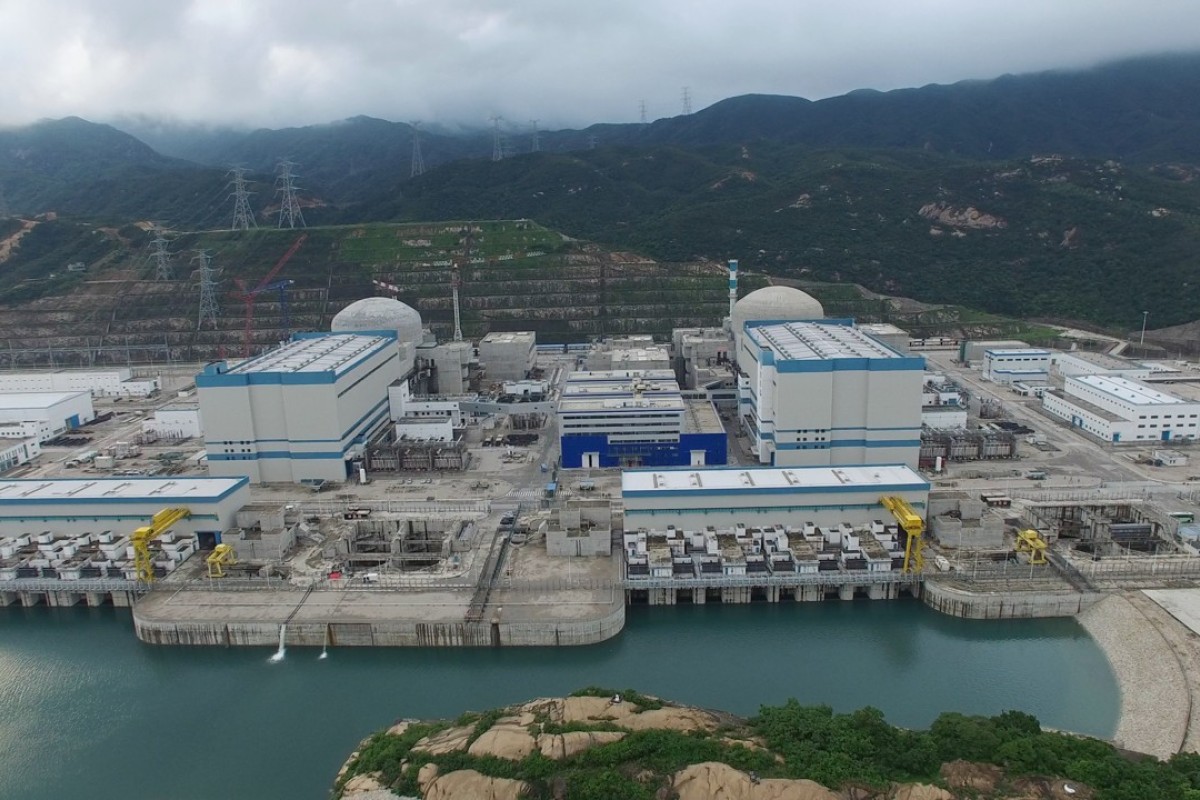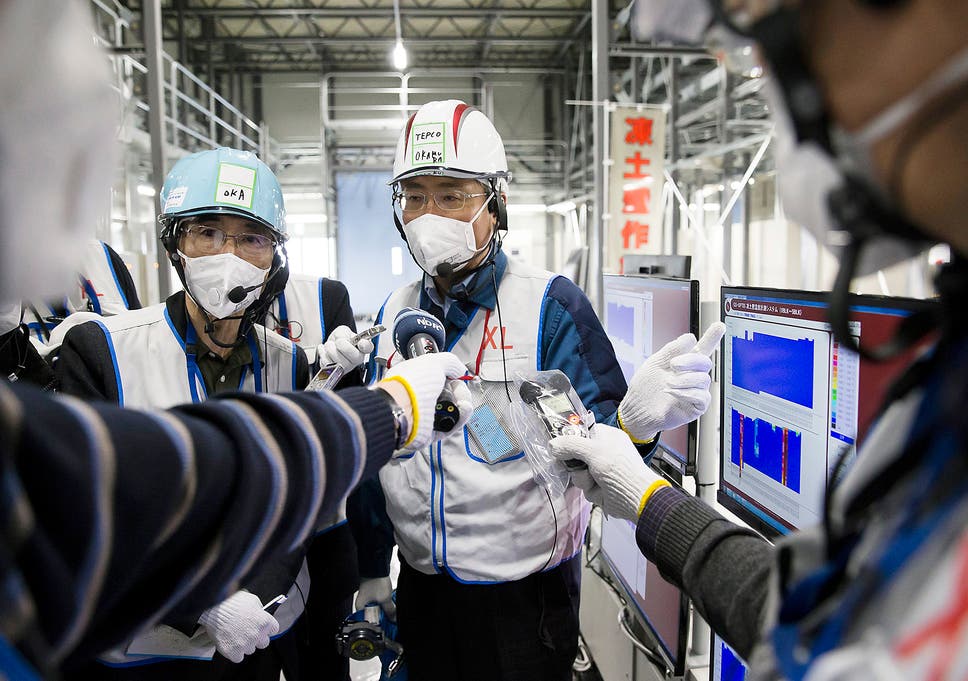
THE CIRCLE (China) Panicked shoppers thronged supermarket aisles, grabbing bags of salt by the armful. They queued six deep outside wholesalers. Most went home with only one or two bags; the lucky ones managed to snag a five-year supply before stocks ran out.
This was China in the days after Japan's Fukushima nuclear disaster, when people in cities up and down the country's highly populated east coast bought huge quantities of iodized salt in the misguided belief it would protect them from radiation.
The 2011 disaster — the worst nuclear accident in 25 years — threw a major wrench into China's ambitious nuclear plans. It sent authorities scrambling to reassure people that they were not at risk of a similar catastrophe and sparked an immediate moratorium on new power plants.
That ban was lifted this year. Now, China is gradually ramping up construction again.
With around a dozen nuclear power plants in the works, China will overtake France as the number two producer of atomic energy worldwide within two years. If it continues with its aggressive plan, it will surpass the United States to become number one by 2030.


China is the world's largest consumer of energy, thanks mainly to industrial activity. This is only going to increase, with households expected to use nearly twice as much energy by 2040, according to the International Energy Agency. At present, some 60% of that energy consumption is powered by coal. But China is spending heavily on natural gas and nuclear power, as well as renewables — the country accounted for almost half of all investments in the latter globally in 2017.
Beijing's outward enthusiasm for nuclear energy masks a multitude of challenges facing China's atomic plans.
Surveys and protests against proposed nuclear plants suggest ordinary Chinese are a lot less enthusiastic about nuclear power than their leaders are. The potential ramifications of a nuclear disaster in the world's most populated country are stark, to say nothing of economic or environmental fallout. And while China's nuclear industry has a strong safety record — and domestic regulations have tightened since Fukushima — some fear corruption and supply line issues could undercut these efforts.
Nuclear is also not the attractive clean energy solution it once was. In the years following the Fukushima disaster, renewable energy such as solar and wind have plummeted in price thanks in part to heavy Chinese investment, while new safety standards have driven up the cost of nuclear power.
"For a long time, China was basically subsidizing the (nuclear) industry, and now they're trying to put it on a market footing," said Miles Pomper, a Washington-based expert in nuclear energy at the James Martin Center for Nonproliferation Studies.
"When you do that, oftentimes it doesn't meet the market test, especially competing with wind and other kinds of power."
China's National Energy Administration and Atomic Energy Authority did not respond to requests for comment for this report.
Nuclear panic
The Fukushima disaster was a shocking wake-up call to all countries with coastal nuclear plants. It raised concerns that other plants could be vulnerable to tsunamis and other extreme weather.
On March 11, 2011, a 9.0-magnitude earthquake rocked Japan. It permanently moved the country's main island, destroyed buildings, and raised a tsunami up to 40 meters (131 feet) high, which crashed into the country's east coast.
Within 50 minutes of the initial earthquake, the first wave crested the Fukushima Daiichi nuclear plant's 10-meter (33 foot) sea wall. The plant's emergency power generators were soon flooded, knocking vital cooling systems offline and causing reactor fuel rods to begin to meltdown and leak deadly radiation into the surrounding area.
It was the worst nuclear disaster since the 1986 Chernobyl meltdown. More than 300,000 people were evacuated from the area around the Fukushima plant, and many will never be able to go home. Clean up operations, estimated to cost upwards of $50 billion, are still ongoing.
The disaster broke Japan's longstanding commitment to nuclear power and prompted a four-year moratorium on the country's atomic energy production.
The sudden aversion to nuclear energy reached China, where the State Council immediately suspended approval of nuclear power projects and ordered a comprehensive safety inspection of all existing facilities. New regulations were passed, including the 2020 Vision for Nuclear Safety and Radioactive Pollution Prevention, which set safety standards and inspection goals, as well as a Nuclear Safety Act that went into effect last year.
In particular, according to a report by the International Atomic Energy Agency (IAEA), new power supplies and water pumps were issued to all Chinese nuclear plants to protect against the flooding and power loss suffered at Fukushima. New emergency response protocols were introduced, including the need for emergency response drills.
The effect of the disaster on China's domestic nuclear industry has been profound. Some semi-official projections that China might have more than 400 nuclear plants by 2050 "have been cut in half," according to Mark Hibbs, an analyst with the Carnegie Endowment and co-author of "Why Fukushima Was Preventable."
The failure of Japan, "one of the world's most technologically equipped and experienced" countries as regards nuclear power, raised serious questions as to whether China too was vulnerable to a serious accident, Hibbs wrote in a report on the country's nuclear industry last year.
Safety fears
Despite China's efforts to alleviate public concern after Fukushima with a moratorium and new safety checks, support for nuclear energy remains tepid at best and outright hostile at worst.
A government-supported survey in August 2017 found that "only 40% of the public supports the development of nuclear power in China," according to the Chinese Academy of Engineering. The Fukushima accident "has had the consequence that the public has become more sensitive to the possible development of nuclear energy projects, and is opposing such projects, especially near their homes."
Plans to build a nuclear waste processing plant in the eastern province of Jiangsu resulted in violent protests from locals and the project eventually being scrapped in August 2016, according to Chinese media.
The nuclear industry has long struggled to combat fears about safety, which many proponents of atomic energy say are overblown. They argue that famous incidents — Fukushima, Chernobyl and Three Mile Island — are outliers which do not reflect the overall situation.
The World Nuclear Association (WNA) argues that "in over 17,000 cumulative reactor-years of commercial nuclear power operation in 33 countries," only three major accidents have occurred.
"The evidence over six decades shows that nuclear power is a safe means of generating electricity," according to the WNA. "The risk of accidents in nuclear power plants is low and declining."
The WNA estimates that around 11% of the world's electricity is generated by about 450 nuclear power reactors. Some 60 more reactors are under construction around the world.
China, in particular, can boast that in three decades of operating nuclear plants, it has never experienced a major accident. According to Xue Xiaogang, president of the China Institute of Atomic Energy, a government-backed research agency, safety levels in the country's nuclear power plants are now among the highest in the world.
"It is almost impossible that a Fukushima-style accident will happen in China," Xue told state-run broadcaster CGTN in May.
But as the success of the recent TV show "Chernobyl" demonstrated, people remain fascinated — and horrified — by the risks of nuclear disasters and their continuing effect on the world decades later, even if these risks are minimal.
While both Chernobyl and Fukushima were level 7 on the international scale of nuclear accidents, the amount of radiation emitted by the earlier disaster was far greater because the Chernobyl plant exploded, releasing a huge amount of debris and smoke which spread radioactive contamination across Europe.
"So far, knock on wood, there hasn't been any significant, major accident (in China)," said Pomper, the nuclear expert. "But there's certainly a lot of skepticism and concern there, given China's performance in other sectors in terms of safety."
China's industrial safety record has improved substantially in recent years, but "accident rates, death tolls and the incidence of occupational disease are all still comparatively high," said China Labor Bulletin, a workers' rights organization. There were 134 work-related accidents each day on average in 2018, according to official figures.
In his report, Hibbs noted that "China faces numerous challenges from its historically weak industrial safety culture and the strain on regulatory capacity that has been exacerbated by nuclear growth."
"Barring measures to effectively generalize safety culture, more nuclear power reactors in China means greater risk," he said.
Legacy of disaster
Nuclear is, perhaps, the only industry where accidents in one plant or one country have a major knock-on effect worldwide.
This is despite the fact that more deaths are caused every year by fossil fuels, particularly coal, which is a major contributor to air pollution. Air pollution causes more than 4 million deaths per year, according to the WHO, but it is only recently that we have finally begun to move away from our reliance on these materials.
It is the long shadow of nuclear disasters that makes the risks too great to bear for many. Parts of the Chernobyl exclusion zone will remain contaminated for at least 300 years, and it will take decades before the Fukushima plant is fully decommissioned, with tens of thousands of residents still displaced. Some areas around the site may never be totally safe.
The IAEA does not specify sizes for exclusion zones following accidents, just that "it is required that there is only a minor radiological impact outside the site boundary or the exclusion area."
Following the Fukushima disaster, an initial exclusion zone extending 20 kilometers (12.4 miles) around the stricken plant was established, which was later extended to 30 km (18.6 miles), though some experts said at least 80 km (50 miles) should have been considered.
In the densely populated parts of eastern and southern China where many of the country's nuclear reactors are located, such an exclusion zone could impact huge numbers of people.
A 20 km exclusion zone around the Daya Bay nuclear plant in southern China, for example, would include much of the nearby areas of Pingshan and Huiyang, affecting around 1 million people. Any larger exclusion zone could effect the nearby metropolises of Shenzhen and Hong Kong, which between them are home to almost 20 million people.
"You're also dealing with prevailing winds," said Pomper. "Does this blow off into the rest of China, or Korea or Japan?"


Climate crisis solution?
Nuclear power proponents — both inside and outside China — argue that such concerns are overblown, if not downright fearmongering. They point to China's solid safety record on nuclear power, and the expansion of safety protocols and inspections in the years since Fukushima.
They also highlight what they say will be the major loser in a pullback from nuclear expansion: the climate.
By 2030, according to China's 13th Five Year Plan, at least 20% of the country's energy consumption should be from non-fossil fuel sources. Nuclear capacity is expected to grow from around 2% to closer to 10%.
The big loser in this shift will be coal. China's main energy source, the fuel has helped power the country's rapid economic growth in recent decades, but it has been a disaster for the environment and people's health.
China has overtaken the United States as the world's largest emitter of carbon dioxide, and many of the country's cities experience horrific levels of smog due in large part to their reliance on old coal-fired plants. Coal is also a logistics headache, with around half of China's rail capacity used in transporting the fuel, according to the WNA, from the central and northern areas where it is mined to the wealthy cities on the east and southern coasts where energy demands are greatest.
By comparison, nuclear power plants produce virtually no greenhouse gas emissions during operation. Because the amount of uranium or other fuel is vastly smaller than the thousands of tons of coal needed for traditional power plants, transport costs are lower, and nuclear generators can be built close to where they are needed most, meaning savings on electricity transmission, too.
Of course, renewable energy sources such as wind and solar possess many of these benefits as well. China is investing heavily in both, and they are on track to become significant sources of power by 2030 as the country reduces its reliance of fossil fuels. Nuclear power proponents argue that atomic energy is more reliable, as it is not subject to any disruption caused by weather patterns.
However, in the years after Fukushima, as the nuclear industry saw its projects stalled and stringent new safety regulations introduced, renewables have continued to leap ahead, becoming cheaper and more reliable. In the United States, renewable energy, led by solar and wind, is projected to be the fastest-growing source of electricity generation for at least the next two years.
Meanwhile, new regulations and more frequent safety inspections are driving up already the high costs of building new nuclear plants.
"A complaint of the (nuclear) industry is that regulation is costing them all this money and that's why they're not competitive," Pomper said. "But some of it is just basic economics: Nuclear plants are very expensive to build ... and it takes a huge (amount of) time to build them."
He added that while "regulations don't help, a lot of them are necessary, and (nuclear plants) were not very competitive beforehand."
Nuclear energy remains a key part of China's current five-year plan. Whether it is still a priority when that economic blueprint expires next year remains to be seen.
Beijing may decide that far from being a climate panacea, the economics of nuclear energy — along with the risks — no longer make sense in a world that is leaning toward cheaper, more reliable renewable energy.





Comments
Post a Comment